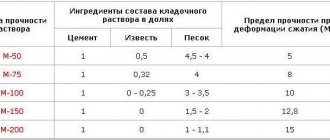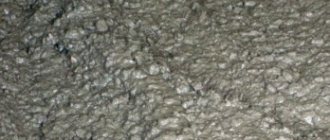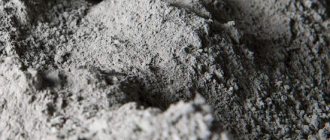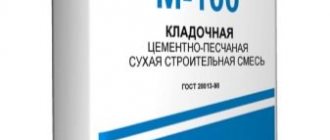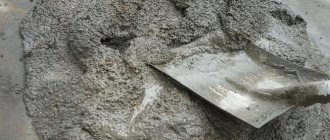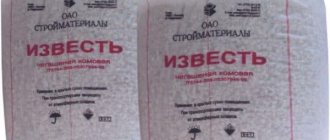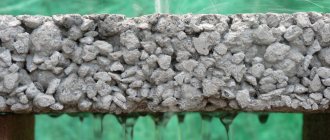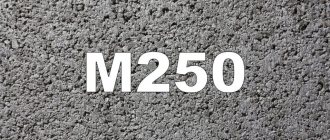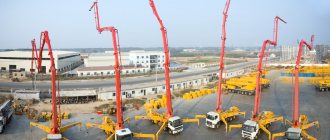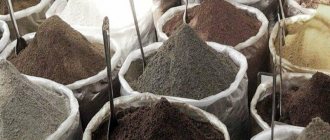SOLUTION BRAND M75
Order
| Brand | Frost resistance F | Styling brand | Price per 1 m3 (with VAT 20%) | |
| Masonry | Mounting | |||
| M75 | 75 | PC3 | 2730 rub. | 2460 RUR |
The construction of brick, block and stone buildings is much faster if you use ready-made masonry mortar, mixed at the factory and delivered to the site ready-made by a truck with a concrete mixer. Builders automatically reduce the costs of installation and maintenance of a mortar-concrete unit, and significantly save time on checking the quality of the mortar. The products are accompanied by certificates of conformity, which are attached to each batch of material.
Application
M75 – masonry or concrete mortar. Hardened stone has low strength - no more than 75 kgf/cm², which is not enough to create full-fledged load-bearing and even most self-supporting elements. For this reason, concrete M75 (v5) is predominantly CPS (meaning cement-sand mixture). To perform some work, coarse filler (crushed stone of different fractions) can be added to the composition.
- M75 masonry mortar is used for the construction of internal and external walls and partitions made of bricks and blocks. For external structures, plasticizers are introduced into the base mixture, increasing the frost resistance of joints to F200 with a simultaneous increase in density and strength (slightly);
- Strengthening drainage layers under the foundation. In this case, concrete B5, which contains crushed stone, can be used;
- Laying foundation blocks below and above ground level. For such cases, frost- and moisture-resistant plasticizers are introduced into the solution to strengthen the cement-sand mixture after hardening;
- Installation of prefabricated reinforced concrete structures and sealing of joints between them (floor slabs, flights of stairs);
- Construction of low and medium-rise houses from aerated concrete and foam concrete blocks;
- Installation of screed for flooring;
- Installation of roof screed under soft tiles and other types of roofing.
Cement-lime mortar is used as plaster for interior and facade walls for rough and finishing.
Scope of application
Cement mortar M75 is indispensable for:
- laying partitions and walls made of stone or brick;
- installation of screeds for soft roofing;
- strengthening the drainage layer under the foundation;
- laying foam, gas and cinder blocks;
- installation of building structures;
- construction of temporary structures and mid-rise buildings;
- screeding and leveling of floors;
- plastering walls and slopes;
- various repair work.
Masonry mortar can also be used as plaster for facade and interior walls when performing rough finishing.
Composition and proportions
The majority of M75 brand mortars are cement-based working mixtures without the introduction of coarse filler (crushed stone and gravel). They are prepared in accordance with GOST 28013-98 “Building mortars. General technical conditions". The composition of the cement-sand mixture includes:
- Binder, usually Portland cement grades M50, M400 or M300 in different quantities;
- Medium-sized sand with a fraction of up to 2 mm;
- Water with a suitable mineral composition;
- Additives – plasticizers to increase the density, strength and water resistance of the material in adulthood (28 days).
The proportions of the components of TsPS M75 depend on the brand of cement:
| Cement brand | Proportions in kg. | |||
| Cement | Sand | Water | Enhancement Additives | |
| M500 | 1 | 7 | To consistency, about 80% of the total mass, according to some recipes - 100% or even more | No more than 5% by weight of cement |
| M400 | 1 | 5 | ||
| M300 | 1 | 4 | ||
Cement-lime mortar is slightly different from the classic mortar: alkali hydroxide gives the working material plasticity and high adhesion to any type of base. In addition, once hardened, alkali cement is less susceptible to moisture.
To prepare cement-lime mortar m75, you need to take the following components in the proposed proportions:
- Cement M500, lime paste and sand 1:0.8:7;
- M400 cement, lime and sand, respectively 1:0.5:5.5.
Water until a plastic solution is obtained, but not more than 80% by weight of cement.
Before mixing the solution, dry lime must be quenched with water in a separate container in advance.
Density and grades
Cement-lime mortar can have different densities. It depends on the raw materials and the ratio of components. The most commonly used types of materials are:
- With low density - up to 1500 kg/m³.
- With high density - from 1500 kg/m³.
Taking into account proportions, materials are divided into different grades. This can be lime mortar M50, M75, mortar M100, etc. The last 2 grades 50 and 100 are characterized by increased strength and resistance to moisture. The additives from the composition have a homogeneous structure, because they do not contain crushed stone.
Grades 100 and 75 are used in the construction of industrial and civil facilities. The compositions are created on the basis of cement, sand and lime, combined in different proportions.
Such solutions are in demand at humidity levels above 75%, which is why they are used in the construction of bathhouses and other buildings with high humidity. Lime also fights fungal growths on walls.
Specifications
In the conditions of factories and construction sites, specialists must carry out tests of M75 mortars, measure the parameters of the mobility of the working mixture and the performance indicators of the molded samples after 28 days.
Main properties of M75:
- compressive strength m75 corresponds to class B5, which means a maximum load of 65 kgf/cm² or in megapascals 65 MPa;
- frost resistance of ordinary mortar without additives – F50;
- water resistance W2 (very low);
- the average density of the solution is 1800 kg/m³.
According to the marking, the M75 solution can withstand loads of up to 75 kgf/cm², but class B5 stands for a maximum load of only 65 kgf/cm². In this case, the reliability of the solution may exceed the class value, which is the norm. In addition, the parameter can be adjusted by increasing the proportion of cement or introducing superplasticizers that increase density, strength, ductility and water resistance.
The weight of 1 m³ of solution, subject to the given proportions, should be approximately 1800 kg. Deviation upward or downward may be due to the quality of the sand and the amount of water. The hardened cube weighs the same, since moisture evaporation should be minimal.
Lightweight concrete M75 is popular among landscape designers, sculptors and builders. This building material has low strength and is well suited for creating borders and garden paths, temporary installations, and for the construction of small buildings. But it also has several disadvantages, due to which it is not used for the construction of more serious objects. Low frost resistance and water resistance, rapid deformation and a rather low strength index (only no more than 65 kg/cm2) do not inspire confidence in this class.
The main advantage of M75 concrete is its slow drying, which makes it easy to correct possible mistakes or completely change the shape of the structure.
How to prepare the solution yourself?
To obtain a solution, cement is mixed with sand having a medium fraction. To prepare the simplest mixture, add 3-4 parts of clean sifted river sand of medium fraction to 1 part of cement. The dry composition is mixed well, and then water is gradually poured in until the solution turns into a homogeneous mass with the required level of mobility. However, this composition quickly hardens during laying, so clay or plasticizers are added to it to increase plasticity and astringent qualities. This solution is easier to level on the wall surface, it will provide better compaction, and the masonry will look neat. A small amount of soap, detergent or washing powder can be added to the mixture as astringents.
Composition and required proportions when mixing
To prepare the M75 mixture, cement, sand, crushed stone in a ratio of 1:3:4 and water are used. It ranks second in the brand rating, after M50 concrete. This is because in the manufacture of M75, the least amount of the most expensive component of the mass is used - cement. In addition, the proportion of additional binding components (fillers) in the composition increases. To produce such building material, you will need 170 kg of M400 cement, that is, 1 part of the proportion, 1053 kg of crushed stone or gravel (it should be noted that this component is not used in M50 cement mortar, which is another difference for M75), 945 kg of sand more larger type than for other mixtures and 210 liters of water. For release, it is advisable to use a large stone, since the initial mixture will be more mobile than mixed with small ones. Often, additional reagents are added to factory solutions to increase frost and water resistance.
The material of this brand is manufactured in compliance with the proportions of components that are different from its other types.
Types of solutions
Let's consider the main brands of cement mortars.
Brand M25 and M50
The cheapest and easiest to prepare options are solutions of grades M25 and M50 according to GOST 28013-98. The composition of this lime mixture is quite standard and includes all the necessary substances such as water and filler. To increase wear resistance and improve the characteristics of M25 concrete, plasticizers are added during its production, which increase the setting time of the material, and also ensures a complete absence of delamination. Having such technical characteristics, mortars of grades M25 and M50 in accordance with GOST 28013-98 for brick can guarantee absolute structural strength and resistance to poor conditions, including heavy rainfall.
Brand M75
If you are in doubt about which mortar is best to choose for laying bricks, it is recommended to pay attention to cement mixtures M75, M50 and M25. Combined with high strength, this material has excellent waterproof qualities. It is very difficult to prepare this type of lime mortar at home.
This is explained by the fact that its production uses very thorough mixing, which can only be achieved using special equipment. Weather conditions can also affect the condition of cement. It is highly not recommended to lower the temperature during the period when hardening occurs. In turn, high temperatures can cause all the moisture from the solution to evaporate too quickly, thereby making the concrete brittle.
The main technical characteristics of this brand include:
- amazing moisture resistance;
- mobility.
resistance to extremely low temperatures;
Brand M75
Along with cement grade M 75 according to GOST 28013-98, cement grade M 100 is also widely popular. Just like M75 and M50, this mortar can be classified as masonry. However, in terms of technical characteristics it is much better. The main quality that distinguishes this product from others is its exceptional water resistance.
Mortar grade m 100 is widely used in the construction of both civil buildings and in the construction of industrial facilities. Another feature of the m 100 solution is that there is no crushed stone in this cement-lime composition. Only special sand for construction needs that meets all quality standards in accordance with GOST can act as a filler.
Where is it used?
Due to their lightness and fragility, concrete M50 and M75 are used for interior finishing (plastering, filling cracks) and laying brick and stone. It is often used for gardening art, columnar foundations for low temporary buildings and for the production of screeds for poured floors and wall insulation. It is not used in the construction of load-bearing power and reinforced concrete structures.
The construction of brick, block and stone buildings is much faster if you use ready-made masonry mortar, mixed at the factory and delivered to the site ready-made by a truck with a concrete mixer. Builders automatically reduce the costs of installation and maintenance of a mortar-concrete unit, and significantly save time on checking the quality of the mortar. The products are accompanied by certificates of conformity, which are attached to each batch of material.
| Brand of solution | Frost resistance (F) | Styling brand | Price per 1 m3 (with VAT 20%) | ||
| Masonry | mounting | ||||
| M75 | 75 | PC3 | 2590 | 2410 | |
Where is M75 masonry mixture used?
The material is suitable for the construction of small houses, as well as industrial facilities. It is compatible with blocks of different porosities and is used in the following works:
- Construction of walls made of brick, stone, and other piece elements.
- Strengthening foundations with low soil moisture.
- Laying tiles.
- Installation of engineering communications.
- Leveling the floor.
- Filling of cracks at humidity up to 60%.
When working with the mixture, it is important to consider the temperature conditions. In cold weather, the process of strength gain slows down, and in excessively hot weather, moisture evaporates too quickly, which negatively affects the ability of the finished masonry to withstand heavy loads.
Technical characteristics of M 75
M75 cement mortar is produced on the basis of M300, M400 or M500 cements, sand and water, taken in certain proportions, regulated by GOST 28013-98. Table 1 shows the composition of the M 75 masonry mortar depending on the brand of cement used.
| Cement brand | cement | sand | water |
| M300 | 1 | 4 | Depending on the required consistency |
| M400 | 1 | 5 | + |
| M500 | 1 | 7 | + |
The quality of the masonry mortar largely depends on the condition of the components. Only sand washed and sifted on our own seeder with fractions of no more than 1.8 mm without containing clay, crushed stone or other foreign impurities is used. Cement is used only of the highest quality and fully complies with the declared brands.
To use the solution in winter or autumn, as well as under high humidity or other special conditions, plasticizers, various additives and additives that improve the consumer qualities of the solution can be added to the solution, in agreement with the customer.
Compound
Masonry mortar is an artificial stone material obtained after hardening of a mortar mixture, which includes a binder, sand, water and various additives. Masonry mortars are used for rubble, stone and brick masonry.
Sand for masonry mortar should be no larger than 2.5 mm.
Organic substances (technical lignosulfonates - LST, sulfite-yeast mash - SDB and soap naft) and inorganic (volcanic ash, ash, ground slag, etc.) can be used as additives. Winter solutions contain antifreeze and air-entraining additives.
Masonry mortar for bricks must be plastic. For brickwork, a cement-lime composition or a warm lime mortar is best suited.
Application of M75 solution
The strength of construction cement mortar is 75 kg/cm 2, which allows it to be used for:
- brickwork of multi-storey buildings (load-bearing walls, partitions, facades);
- construction from aerated concrete, foam concrete and slag blocks;
- installation of prefabricated reinforced concrete structures;
- installation of foundation blocks, including below ground level.
- installation of screeds under floors and soft roofs.
The density of the M75 solution depends on the presence of additives and can vary within a fairly wide range
The use of additives and additives allows the production of a solution in the frost resistance range from F50 to F200. The number indicates how many cycles of complete freezing and thawing the solution can withstand without changing its basic mechanical properties.
The water permeability of cement mortar M75 is within W6-W8 - it can withstand the pressure of a water column with a height of 6 - 8 m (6-8 atm.). This indicator corresponds to the best types of construction concrete.
How to make masonry mortar
First you need to select the composition of the masonry mortar.
Preparation of cement-sand mortar
Table 1. Proportions of cement masonry mortar:
| Brand of solution, kgf/cm 2 | Recommended brand of cement | Cement/sand ratio in the mixture |
| M25 | CEM 22.5 (M300) | 1:9,5 |
| M50 | CEM 22.5 (M300) | 1:5,8 |
| CEM 32.5 (M400) | 1:7,4 | |
| M75 | CEM 22.5 (M300) | 1:4,2 |
| CEM 32.5 (M400) | 1:5,4 | |
| CEM 42.5 (M500) | 1:6,7 | |
| M100 | CEM 22.5 (M300) | 1:3,4 |
| CEM 32.5 (M400) | 1:4,3 | |
| CEM 42.5 (M500) | 1:5,3 | |
| M150 | CEM 22.5 (M300) | 1:2,6 |
| CEM 32.5 (M400) | 1:3,25 | |
| CEM 42.5 (M500) | 1:3,9 |
How to buy M75 solution:
You can order M 75 solution in several ways:
- adding the required product on the website and using the “Cart” button to order online;
- by writing an email;
- by calling;
- ordering a call back.
Prices and delivery conditions are discussed additionally. The plant has the technical ability to fulfill an order of any volume on the day the application is submitted. The finished masonry mortar is delivered to the site by special transport and can immediately be used in construction operations.
If you have any questions, call / 8-967-593-17-23 (Anna) or use the feedback form. Our specialists will help you! We are waiting for your applications!
Other grades of concrete
Calculate order cost
Concrete at manufacturer prices with delivery throughout the city and region
The site uses cookies. When using the site, we process your data so that interaction with our site is as informative as possible and meets your interests.
We accept payment
Contact us
Our partners
Partners in other cities:
- Balashikha
- Volgograd
- Voronezh
- Ekaterinburg
- Kazan
- Permian
- Podolsk
- Rostov-on-Don
- Saint Petersburg
CONCRETE PLANT ″SORZHA″
Stable quality
We test concrete in our own laboratory
Low prices
Wholesale prices for building materials
Rental of special equipment
Concrete pumps and concrete mixer trucks in stock
Prompt delivery
Timely shipment of concrete, meeting deadlines
Calculator Solution-Online v.1.0
Calculation of the composition of mortar for brick (stone) laying and other masonry work. The calculator is based on data from SP82-101-98: Preparation of mortars. Implemented counting of batches in a concrete mixer and other containers.
Delivery from 1 m3 in Moscow and the region
Powdered building materials are transported in big bags. The bags are convenient for storage and protect the contents from premature deterioration. Ready-made solutions are delivered by our own mixers with a capacity of 7-12 cubic meters. Shipment is possible in volumes from 1 cubic meter. m.
Applications are accepted 24 hours a day, seven days a week. Delivery is carried out on the same day. RBU vehicles will deliver the material in the required volume to any point in the Moscow region with strict adherence to deadlines. This will be monitored by your personal manager, who is also ready to visit the construction site to help organize the access of special equipment.
Order masonry mixture M75 and coordinate delivery time by phone. Our manager will answer questions, calculate costs, and help with delivery. You can place your order online or by phone at any time. We work around the clock, without breaks or weekends. Our own mixers, concrete pumps, and trucks will deliver construction materials on the day of order throughout Moscow and the region. BSU products have received GOST certificates confirming quality. During the production process, quality is regularly checked; an accredited laboratory is equipped for this purpose.
*Explanations for the calculator
- The calculator can calculate the volume for both whole numbers and fractions. Example: volume of concrete 3m 3, volume of concrete 50 l (0.05 m 3).
- The calculator implements calculations for a mixture with mobility P3 (9-10 cm of cone slump) for cement-lime mortars (according to SP82-101-98). Water consumption for mixtures with different mobility is based on experimental batches. The mobility you need can be viewed in the “Mobility” field, which is automatically filled in when you select “Solution purpose”.
Brick laying mixture; brand of masonry mortar
Masonry mortar is an important component of a wall's masonry, occupying about a quarter of its volume. It binds stone materials together, turning the wall into a single structure. Today, the most common types of mortars are cement ones. You can prepare them yourself, buy them at a mortar-concrete unit, or use a ready-made mixture for laying bricks, the assortment of which is widely available in construction stores.
- Composition of mortar Cement and sand
- Additives to the solution
- Influence of degree of mobility
- Preparation of the workplace
Algorithm for calculating the composition of a solution
Selection of solution composition for 1 m3 of sand
To implement the calculator, the data and calculation algorithm were taken from:
1. Determine the consumption of binder (cement) per 1 m3 of sand depending on the selected brand of mortar and brand of cement.
We determine the cement consumption per 1m3 of sand using the formula:
2. Determine the volume of lime per 1 m3 of sand using the formula:
where Qв
– consumption of binder (cement) per 1 m3 of sand, kg
Vd
– inorganic additive (lime) per 1 m3 of sand, m3.
We determine the mass of lime per 1m3 of sand using the formula:
where Qd
– consumption of additive (lime) per 1 m3 of sand (kg);
λ
– bulk density of additive (lime) kg/m3;
3. We make up the proportion of the volumetric parts of the solution
You can also use the table of ready-made proportions in volumetric ratios (Table 4 SP82-101-98)
4. Determine the water consumption per 1 m3 of sand.
The approximate water consumption in SP82-101-98 is shown for a mixture with mobility P3 (9-10 cm depth of cone settlement). This mobility according to GOST 28013-98 is suitable for masonry made of solid bricks and ceramic stones. Water consumption for other mixture mobility is determined as a result of trial batches. We can select the mobility we need depending on the purpose of the solution using the table presented in GOST 28013-98
Conditions and prices for delivery by mixers with a 10m long feed belt.
DELIVERY IN THE CITY
- Minimum delivery volume: 1m3.
- Minimum delivery cost: 6000 rub.
- Delivery cost over 6 m3: 1000 rub./m3
DELIVERY OUTSIDE THE CITY
- Minimum delivery volume: 1m3.
- Orders 6m3 – cost 1000 rub./m3 + 500 rub./m3 for every 10 km. outside the ring
- Travel post + 1000 rub./piece.
Free unloading time: 1 hour Quantity in stock: 2 mixers. Volume: 6m3, 8m3. Tape length: 10m. Feeding height: up to 3m.
We work in Samara: in the region, in the districts
Ours accepts orders for the purchase of M75 solution with delivery in Samara, throughout the region. We work in city districts, microdistricts: Alekseevka, Bezenchuk, Bogatoye, Bolshaya Glushitsa, Bolshaya Chernigovka, Borskoye, Elkhovka, Isakly, Kamyshla, Kinel, Kinel-Cherkassy, Klyavlino, Koshki, Krasnoarmeyskoye, Krasny Yar, Neftegorsk, Pestravka, Pokhvistnevo, Volga region . See also, Sergievsk, Togliatti, Syzran, Khvorostyanka, Chelno-Vershiny, Shentala, Shigony. Alekseevka, Bezenchuk, Bogatoye, Bolshaya Glushitsa, Bolshaya Chernigovka, Borskoye, Elkhovka, Isakly, Kamyshla, Kinel, Kinel-Cherkasy, Klyavlino, Cats, Krasnoarmeyskoye, Krasny Yar, Neftegorsk, Pestravka, Pokhvistnevo, Volga region, Sergievsk, Togliatti, Syzran, Khvorostyanka . 15th microdistrict, Zubchaninovka, 16th km, Sukhaya Samarka, Bereza village, Privolzhsky, Yungorodok, Yamy village, Verkhniye Yamy village, 6th deadlock village, 12th microdistrict, Sorokiny Khutora village, Rubezhny village, Krasnaya Glinka village, 3rd microdistrict, Shmidta village, Rechnoy microdistrict, 6th Tupik village, Vtorchermet village, Tolevy village, 14th microdistrict, 14A microdistrict, 15A microdistrict, 18th microdistrict, Studeny Ovrag village, Barboshina Polyana, Yablonka village , Eighteenth Kilometer village, Chkalova village, Kozelkovskaya station village, Ozerki village, Krasny Pakhar village, Gorely Khutor village, Kozelki village, Zhigulevskie Vorota quarter, Doma EMO village, Yuzhny village, 41 kilometer village, Tsarev Grad cottage village, Vintai village, village Coastal, Kryazh village, State Farm Volgar village, Zasamarskaya Slobodka village, Kirzavod-6 village, State Farm Kryazh village, Peschanaya Glinka village, Rubezhnaya Glinka village, Rubezhny village, Privolzhsky microdistrict, 7th microdistrict, 8th microdistrict, 7B microdistrict, 7A microdistrict, 9th microdistrict, 10th microdistrict, 11th microdistrict, Solnechny-1 quarter, Solnechny-2 quarter, Solnechny-3 quarter, Solnechny-4 quarter, Solnechny-5 quarter, Solnechny-6 quarter, 6th microdistrict Hide
